Are you debating whether to write a resignation letter or send an email? The decision between the two can be a tough one. In this article, we will explore the attributes associated with both options and provide examples to help you make the right choice. Feel free to modify the examples to suit your specific situation.
Attributes of Should I Write A Resignation Letter Or Email:
- Formality: A resignation letter is typically more formal than an email. It allows you to express your gratitude and professionalism in a written format.
- Documentation: A resignation letter provides a written record of your decision to leave the company. This can be important for legal or HR purposes.
- Personal Touch: A resignation letter allows you to personalize your message and show your appreciation for the opportunities you’ve had at the company.
- Delivery: An email is a quicker and more convenient way to resign, especially if you need to do so promptly.
- Response: A resignation letter may prompt a face-to-face meeting with your supervisor to discuss your departure, while an email may lead to a more immediate response.
Example of Should I Write A Resignation Letter:
Dear [Recipient’s Name],
I am writing to formally resign from my position as [Your Job Title] at [Company Name], effective [Last Working Day, typically two weeks from the date of the letter]. I have enjoyed my time at the company and am grateful for the opportunities for growth and development that I have experienced here.
I want to thank you and the team for your support and guidance during my time at [Company Name]. I have learned a great deal and will always value the experiences I’ve had here.
Please let me know if there is anything specific I need to do before my departure. I am committed to ensuring a smooth transition and am happy to assist with training my replacement, if needed.
Thank you once again for the opportunities I’ve had at [Company Name]. I wish the company continued success in the future.
Sincerely,
[Your Name]
Should I Write A Resignation Letter Or Email
How to Write a Classy Resignation Letter in 7 Steps + Sample | Joblist

Resignation Letter Examples – ResumeViking.com

Dos and Don'ts for a Resignation Letter

Download Resignation Letter Samples

How To Properly Write A Resignation Letter | scrumps

14+ Resignation Email Template | Free Word, Excel & PDF Formats

